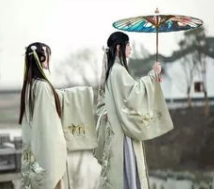Dressed in a flowing long robe adorned with beaded floral embroidery from a bygone era, stylist Xiao Hang looks like she surfaced from a time machine as she strides across the bustling Beijing metro, attracting curious glances and inquisitive questions.
身穿一件以珠子和绣花装饰的古代飘逸长袍,设计师肖航(音)仿佛刚刚从一台时间机器里走出来,穿行在熙熙攘攘的北京地铁里,引来好奇的目光和追问。
China has embraced Western fashion and futuristic technology as its economy boomed in recent decades, but a growing number of young people like Xiao are looking to the past for their sartorial choices and donning traditional "hanfu", or "Han clothing".
在过去几十年里,随着中国经济繁荣发展,中国人接受了西方的时尚和先进的未来技术,但是越来越多的像肖航这样的年轻人开始在穿着打扮上追求复古,穿起了传统的汉服。

These historic costumes of the Han ethnic majority are enjoying a renaissance in part because the government is promoting traditional culture.
汉服这种历史服饰正迎来复兴,这在一定程度上是因为政府致力于推广传统文化。
Period dramas have also contributed to the surge in interest for traditional Chinese garb -- "The Story of Minglan", a TV series set in the Song Dynasty, garnered more than 400 million viewers in three days when it debuted earlier this year.
此外,一些古装电视剧的热播也激发了人们对中国传统服饰的兴趣。今年初,以宋朝为背景的古装电视剧《知否知否应是绿肥红瘦》首播后,三天内就吸引到了超过4亿观众。
There is no uniform definition of what counts as hanfu since each Han-dominated dynasty had its own style, but the outfits are characterized by loose, flowing robes that drape around the body, with sleeves that hang down to the knees.
汉服没有统一的定义,因为汉人统治的每个朝代都有自己的风格,但汉服的共同特征是宽松飘逸的披身长袍和长至膝盖的袖子。
"When we were little, we would also drape sheets and duvets around ourselves to pretend we were wearing beautiful clothes," Xiao told AFP.
肖航告诉法新社记者说:“我们小时候也会用床单和被子把自己包起来,假装穿的是漂亮衣服。”
Xiao, who used to work at a state-owned machine manufacturing company, now runs her own hanfu business, where she dresses customers for photo shoots and even plans hanfu-style weddings.
曾在一家机械制造国企工作的肖航现在经营汉服生意,主要是为汉服摄影顾客提供服装搭配服务,有时还会策划汉服形式的婚礼。
In modern China, the hanfu community spans the gamut: from history enthusiasts to anime fans, to students and even young professionals.
在现代中国,汉服爱好者遍及各个领域:从历史爱好者到动漫迷,再到学生甚至是年轻的职场人士。
Yang Jiaming, a high school student in Beijing, wears his outfit under his school uniform.
北京高中生杨佳明(音)把他的古装穿在校服里面。
"Two-thirds of my wardrobe is hanfu," he said, decked out in a Tang-style beige gown and black boots at a hanfu gathering, adding that his classmates and teachers have been supportive of his style.
他穿着唐代样式的米色长袍和黑色靴子参加一场汉服聚会。他说:“我的衣橱里有三分之二是汉服。”他还说,他的同学和老师都支持他的穿衣风格。
Clothes are the "foundation of culture," said Jiang Xue, who is part of Beijing-based hanfu club Mowutianxia.
位于北京的汉服社团墨舞天下的成员江雪(音)说,衣着是“文化的基础”。
"If we as a people and as a country do not even understand our traditional clothing or don't wear them, how can we talk about other essential parts of our culture?" she said.
她说:“如果我们作为一个民族、一个国家甚至不了解我们的传统服装或者不穿它们,我们怎么去谈论我们文化的其他重要部分?”
There is some way before the style reaches mainstream acceptance in China.
不过,这种风格要在中国得到主流认可还有一段路要走。
Others say they're deterred by the odd looks they get when wearing hanfu in public.
有人表示,公共场合的异样目光让他们不敢穿汉服。
"I used to be very embarrassed to wear (hanfu) out," screenwriter Cheng Xia told AFP.
编剧程夏(音)告诉法新社记者说:“我以前穿着汉服出去感到很尴尬。”
Yang, the high school student, is more upbeat.
然而,高中生杨佳明却更加乐观。
He said: "At the very least, we can wear our own traditional clothes."
他说:“至少,我们可以穿自己的传统服装。”
来源:可可英语

参与评论